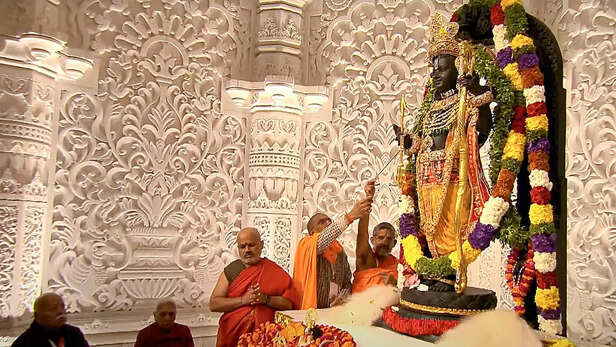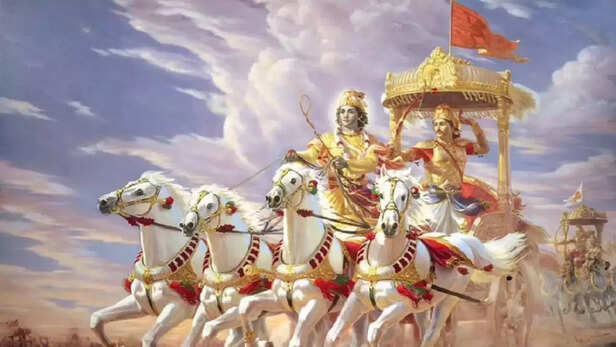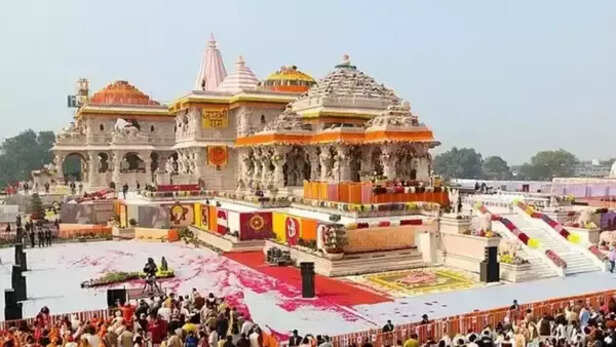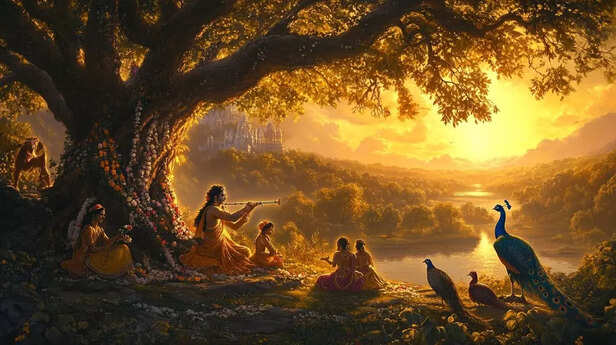Creator and Creation: Insights from the Bhagavad Gita on God and Soul
Nidhi | Dec 31, 2024, 17:02 IST
God
Discover the profound spiritual relationship between God and the Soul through the lens of the Bhagavad Gita. This article explores the Creator’s infinite nature, the Soul’s eternal essence, and their interconnection as described in Hindu scriptures. Learn how meditation, devotion, and selfless action can deepen your understanding of these divine truths and guide you toward liberation (moksha).
In the vast tapestry of Hindu philosophy, the relationship between the Creator (God) and the creation (Soul) is a cornerstone of spiritual exploration. Rooted in texts like the Bhagavad Gita and the Upanishads, the interplay between these two divine aspects unveils profound truths about existence, purpose, and liberation. Let us embark on a journey to unravel the distinctions and connections between God and the Soul, using ancient scriptures as our guide.Understanding God: The Infinite Creator
In Hinduism, God is often referred to as Brahman, the ultimate reality, or Ishvara, the personal deity governing the universe. The Bhagavad Gita describes God as the all-encompassing, omnipotent, and omniscient force. In Chapter 10, Verse 8, Krishna declares:
"I am the source of all spiritual and material worlds. Everything emanates from Me."(Bhagavad Gita 10.8)
God, as the Creator, transcends time and space, existing beyond the limitations of the physical and mental realms. This infinite presence is described in the Mundaka Upanishad:
"Brahman is infinite, and the universe is infinite. The infinite proceeds from the infinite. If you subtract the infinite from the infinite, what remains is infinite."
God, therefore, is not confined to creation but is the cause and sustainer of it.
The Soul, or Atman, is described as the eternal, indivisible essence within every living being. It is distinct yet inseparable from the Creator, much like a spark from a fire. In Chapter 2, Verse 20 of the Bhagavad Gita, Krishna explains the eternal nature of the Soul:
"The soul is neither born, nor does it ever die; it has neither been nor will ever be. It is unborn, eternal, ever-existing, undying, and primeval."
Unlike the transient body, the Soul remains untouched by physical existence, moving through cycles of birth and rebirth (samsara), striving to reunite with the Creator.
While God is the Creator, the Soul is a fragment of this divinity, imbued with God’s essence. The Bhagavad Gita often likens the Soul to a drop of water in the ocean of God’s infinity. In Chapter 15, Verse 7, Krishna says:
"The living entities in this world are My eternal fragmental parts. Due to conditioned life, they are struggling with the six senses, including the mind."
This verse highlights the inherent divinity of the Soul while emphasizing its entanglement in the material world.

 The Soul’s ultimate goal is liberation (moksha), where it transcends the cycles of birth and death and merges with the Creator. The Bhagavad Gita beautifully elucidates this in Chapter 18, Verse 66:
The Soul’s ultimate goal is liberation (moksha), where it transcends the cycles of birth and death and merges with the Creator. The Bhagavad Gita beautifully elucidates this in Chapter 18, Verse 66:
"Abandon all varieties of religion and just surrender unto Me. I shall deliver you from all sinful reactions. Do not fear."
This surrender does not signify a loss of individuality but rather a harmonious reunion with the Creator, akin to a river merging into the ocean.
Hindu scriptures often use analogies to explain complex concepts. One such analogy is that of the sun (God) and its rays (Soul). The sun, as the Creator, illuminates and sustains the universe, while the rays, as extensions of the sun, carry its light and warmth. Although distinct, the rays cannot exist without the sun, reflecting the Soul’s dependency on God for its existence and purpose.

Hindu philosophy emphasizes sadhana (spiritual practice) to deepen the understanding of God and the Soul.
Meditation and Self-Inquiry
The practice of meditation helps quiet the mind and allows one to connect with the inner Soul. As the Chandogya Upanishad states:
"Tat Tvam Asi" (You are That)
This mantra reminds practitioners of their divine essence and unity with God.
Surrendering to God through love and devotion fosters a direct relationship with the Creator. Chapter 9, Verse 22 of the Bhagavad Gita illustrates this path:
"To those who are constantly devoted and who worship Me with love, I give the understanding by which they can come to Me."
The pursuit of wisdom through the scriptures helps differentiate the eternal Soul from the material body and comprehend God’s infinite nature.
Performing selfless actions with detachment helps purify the Soul and align it with God’s will.

Despite their distinctions, Hindu philosophy emphasizes that God and the Soul are not separate but interconnected. The Bhagavad Gita teaches that the Creator resides within the creation, and the creation seeks the Creator. In Chapter 10, Verse 20, Krishna declares:
"I am the Soul, O Arjuna, seated in the hearts of all creatures."
This unity reflects the ultimate spiritual truth: the Creator and the creation are two aspects of the same divine reality.
The distinction between God and the Soul is not a divide but an invitation to understand the relationship between the infinite and the individual. While God is the eternal Creator, the Soul is the seeker of that divine unity. Through spiritual practice and self-realization, the Soul can transcend its material bonds and experience oneness with the Creator.
As the Bhagavad Gita and Hindu scriptures reveal, this journey is not just a philosophical quest but the essence of human existence. By contemplating the Creator and connecting with the Soul, one steps closer to the ultimate truth: that we are both distinct and inseparably part of the divine whole.

Ram Mandir
In Hinduism, God is often referred to as Brahman, the ultimate reality, or Ishvara, the personal deity governing the universe. The Bhagavad Gita describes God as the all-encompassing, omnipotent, and omniscient force. In Chapter 10, Verse 8, Krishna declares:
"I am the source of all spiritual and material worlds. Everything emanates from Me."(Bhagavad Gita 10.8)
God, as the Creator, transcends time and space, existing beyond the limitations of the physical and mental realms. This infinite presence is described in the Mundaka Upanishad:
"Brahman is infinite, and the universe is infinite. The infinite proceeds from the infinite. If you subtract the infinite from the infinite, what remains is infinite."
God, therefore, is not confined to creation but is the cause and sustainer of it.
Understanding the Soul: The Eternal Creation

Soul
The Soul, or Atman, is described as the eternal, indivisible essence within every living being. It is distinct yet inseparable from the Creator, much like a spark from a fire. In Chapter 2, Verse 20 of the Bhagavad Gita, Krishna explains the eternal nature of the Soul:
"The soul is neither born, nor does it ever die; it has neither been nor will ever be. It is unborn, eternal, ever-existing, undying, and primeval."
Unlike the transient body, the Soul remains untouched by physical existence, moving through cycles of birth and rebirth (samsara), striving to reunite with the Creator.
The Relationship Between God and the Soul
While God is the Creator, the Soul is a fragment of this divinity, imbued with God’s essence. The Bhagavad Gita often likens the Soul to a drop of water in the ocean of God’s infinity. In Chapter 15, Verse 7, Krishna says:
"The living entities in this world are My eternal fragmental parts. Due to conditioned life, they are struggling with the six senses, including the mind."
This verse highlights the inherent divinity of the Soul while emphasizing its entanglement in the material world.
Key Differences Between God and Soul

Mahabharat
- God (Creator): Infinite, omnipresent, and beyond the confines of time and space.
- Soul (Creation): Eternal and individual, residing within the physical body.
- God (Creator): Infinite, omnipresent, and beyond the confines of time and space.
- Soul (Creation): Eternal and individual, residing within the physical body.
- God (Creator): Creator, sustainer, and destroyer of the universe.
- Soul (Creation): Seeker of liberation, bound by the cycles of karma and samsara.
- God (Creator): Creator, sustainer, and destroyer of the universe.
- Soul (Creation): Seeker of liberation, bound by the cycles of karma and samsara.
- God (Creator): The source of all existence.
- Soul (Creation): A fragment of divine energy.
- God (Creator): The source of all existence.
- Soul (Creation): A fragment of divine energy.
- God (Creator): Governs the cosmos.
- Soul (Creation): Strives to achieve unity with God through self-realization.
- God (Creator): Governs the cosmos.
- Soul (Creation): Strives to achieve unity with God through self-realization.
God as the Source of Liberation

God & Soul
"Abandon all varieties of religion and just surrender unto Me. I shall deliver you from all sinful reactions. Do not fear."
This surrender does not signify a loss of individuality but rather a harmonious reunion with the Creator, akin to a river merging into the ocean.
The Analogy of the Sun and Its Rays
Spiritual Practices to Realize the Connection

Ram Mandir
Hindu philosophy emphasizes sadhana (spiritual practice) to deepen the understanding of God and the Soul.
Meditation and Self-Inquiry
The practice of meditation helps quiet the mind and allows one to connect with the inner Soul. As the Chandogya Upanishad states:
"Tat Tvam Asi" (You are That)
This mantra reminds practitioners of their divine essence and unity with God.
Devotion (Bhakti Yoga)
"To those who are constantly devoted and who worship Me with love, I give the understanding by which they can come to Me."
Knowledge (Jnana Yoga)
Karma Yoga
The Unifying Truth

Peace
Despite their distinctions, Hindu philosophy emphasizes that God and the Soul are not separate but interconnected. The Bhagavad Gita teaches that the Creator resides within the creation, and the creation seeks the Creator. In Chapter 10, Verse 20, Krishna declares:
"I am the Soul, O Arjuna, seated in the hearts of all creatures."
This unity reflects the ultimate spiritual truth: the Creator and the creation are two aspects of the same divine reality.
Conclusion: A Journey Toward Unity
As the Bhagavad Gita and Hindu scriptures reveal, this journey is not just a philosophical quest but the essence of human existence. By contemplating the Creator and connecting with the Soul, one steps closer to the ultimate truth: that we are both distinct and inseparably part of the divine whole.
